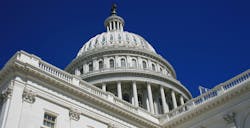Clinical lab leaders will work with political leaders to make the best policy choices for diagnostics.
Diagnostic innovation continues to be front and center in the advancement of medical science. Public policy consistent with and supportive of a thriving and dynamic research environment that produces safe and effective results benefitting patient care and access remains a priority for clinical labs across the nation and the organizations that represent them—including the American Clinical Laboratory Association (ACLA), whose presidency I assumed on January 1, 2017.
Clinical laboratories continue to innovate and deliver new diagnostic services to patients, particularly in genomic and molecular diagnostics, but federal issues and questions are continuing to develop which will significantly impact the laboratory landscape, particularly in the areas of Medicare coverage and reimbursement, and regulatory oversight. My organization and others will be working with the new administration and newly sworn-in Congress to develop and implement rational policy in these areas so that clinical laboratories can continue to deliver robust innovation and patient access to high-quality diagnostics.
As all of us in the diagnostic and greater healthcare provider community enter 2017 considering the political and administrative changes taking place, it is prudent to move forward with thoughtful reflection on last year’s policy initiatives and decisions and their impact as well as consider what may be on the horizon as a new Congress takes shape and a new administration assumes the White House. In taking a look back, we can assess where we are and where we need to be for 2017 and beyond.
FDA regulation of LDTs
The FDA’s decision not to issue final guidance to regulate LDTs allows the stakeholder community and Congress to move forward with ongoing discussions on how to enact meaningful reform that will not hinder innovation or delay patient access to accurate and reliable diagnostic services.
Clinical lab leaders appreciate the FDA’s acknowledgement that ongoing bipartisan work carried out in the House and Senate is the appropriate process to advance comprehensive statutory reform of the LDT regulatory framework. The congressional process has paved the way for a transparent discussion aimed toward constructing regulatory measures fitting for LDT innovation and purpose.
In 2017, the clinical laboratory community looks forward to working with all stakeholders, including the new administration, as diagnostic innovation continues to have a decisive role in the advancement of medical science. Working together, stakeholders must endeavor to find appropriate ways to amend current regulation without inhibiting innovation. We are committed to finding a bipartisan approach with Congress that allows innovation to flourish while expanding patient access.
The CLFS provisions in PAMA
Similarly, industry and political leaders commended the Centers for Medicare and Medicaid Services (CMS) on its decision to delay the implementation of the new Clinical Laboratory Fee Schedule (CLFS) in the Protecting Access to Medicare Act (PAMA) until January 1, 2018. ACLA called for the implementation delay in its comments to the proposed rule, as did members of the House Ways & Means Committee, the leadership of the Senate Finance Committee, and organizations such as the American Hospital Association, the American Medical Association, and the National Independent Laboratory Association.
The establishment of a market-based system for determining Medicare reimbursement for laboratory services was clearly preferable to the alternative—unlimited cuts to payment rates by CMS through its technological changes authority, as well as across-the-board reductions to the CLFS by Congress.
In 2017, clinical labs will be working with CMS to ensure a successful implementation, including the first data collection period during the beginning of 2017, so that prices will accurately reflect the market.
We are hopeful that the PAMA provisions impacting clinical laboratories will result in a rational marketplace that lends itself to fair and consistent reimbursement that recognizes the value of diagnostics and their impact on patient treatment.
GSPs and MAAAs
ACLA stated its strong opposition to the 2016 Final Gapfill Payment Determinations, which include drastic cuts to Medicare payment rates for some multianalyte assays with algorithmic analyses (MAAAs) and genomic sequencing procedures (GSPs). These two types of vital advanced laboratory diagnostic tests are considered crucial aspects of the federal government’s Precision Medicine Initiative. Today, many of the tests falling into these categories are recognized as the standard of care for the diagnosis of certain conditions, or for the high-value prediction or monitoring of therapeutic response.
In 2017, the coverage and pricing decisions, particularly for new tests, must rely on a rational, even predictable process. Current Medicare pricing is insufficient for these critical tests that are pivotal to the practice of medicine and advancing the quality and effectiveness of patient care. Lab leaders should commit to work with the new administration to ensure that the latest in diagnostic innovation is accessible to patients to aid in the diagnosis, treatment, and prevention of disease.
Going forward
Genetic and molecular diagnostic research needs to be prominent in the health policy discourse. In the last Congress, we witnessed significant bipartisan success in advancing medical science through efforts such as the 21st Century Cures Act and the Beau Biden Cancer Moon Shot. Diagnostics, too, offers bipartisan opportunities for the new administration, Congress, and industry stakeholders to deliver smart, pragmatic, and less burdensome regulation along with appropriate reimbursement for diagnostic testing and investment in medical innovation. We must work together to ensure that 2017 is a year of progress in clinical laboratory diagnostics for the benefit of all patients.
Julie Khani is President of the American Clinical Laboratory Association, a not-for-profit association representing the nation’s leading national, regional and esoteric clinical laboratories on key issues of common concern, including federal and state government reimbursement and regulatory policies.

